Artist, cartoonist, songwriter, film-maker (b.1944)
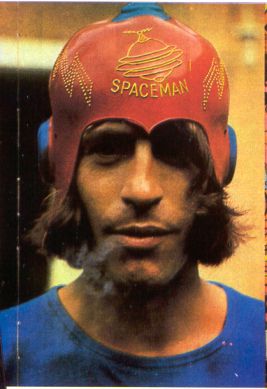
As an artist, cartoonist, songwriter and film-maker, Martin Sharp has made tremendous contributions to Australian and international culture since the early 60s, and he is hailed as Australia's foremost Pop artist.
The "acknowledged king of the UK poster scene in the 60's", his famous psychedelic posters of Dylan, Donovan and others rank as classics of the genre, alongside the work of Stanley Mouse, Rick Griffin, Hapshash & The Coloured Coat and Milton Glaser. His covers, cartoons and illustrations were a central feature of OZ magazine, both in Australia and in London. Martin also co-wrote one of Cream's most famous songs, and in the '70s he became a champion of singer Tiny Tim, and of Sydney's embattled Luna Park.
Martin was born in Sydney in 1944 and was educated at Cranbrook private school, where his teachers was the noted artist Justin O'Brien. In 1960 Martin enrolled at the National Art School at East Sydney, where began his artistic career, contributing to the shortlied student magazine The Arty Wild Oat, along with fellow artists Garry Shead and John Firth Smith. He also began submitting cartoons to The Bulletin. In 1961 he enrolled for two terms in Architecture at Sydney University before returning to the NAS.
In late 1963 or early 1964 Martin met Richard Neville, editor of the University of NSW student magazine Tharunka, and Richard Walsh, editor its Sydney University counterpart Honi Soit. Both wanted to publish their own "magazine of dissent" and they asked Sharp and Shead to become contributors. The magazine was dubbed Oz and from 1963-65 Martin was its art director and a major contributor.
Australian Oz hit the streets on April Fool's Day, 1963. Its irreverent attitude was very much in the tradition of the student newspapers, but its growing public profile quickly made it a target for "the Establishment", and Australian Oz soon became a prominent casualty of the so-called "Censorship Wars".
Martin held his first one-man exhibition at the Clune Galleries in Sydney in 1965. "Art for Mart's Sake" was virtually sold out on the opening night. One of the paintings exhibited also featured in Shead's James Bond spoof Blunderball, made earlier that year.
During the life of Australian Oz Sharp, Neville and Walsh were twice charged with printing an obscene publication. The first trial was relatively minor, and should have been a non-event, but they were poorly advised and pleaded guilty, which resulted in their convictions being recorded, As a result the second obscenity charge was a considerably more serious affair -- they were tried, found guilty and given prison sentences. Their convictions caused a public outcry and were subsequently overturned on appeal, but the pressure was on and the "OZ Three" realised that there was little future battling such strong opposition.
In 1966 Martin published a selection of cartoons in the book Martin Sharp Cartoons. By this time, 'Swinging London' was the mecca for young artists, writers and musicians, and after the traumatic experiences of the Oz trials, Martin and Richard Neville needed little encouragement to leave Australia. They set off on a overland trek through Asia, parting company in Kathmandu and making their separate ways to London.
On arrival, Martin stayed for a short time with Richard Neville's sister Jill in Knightsbridge. It was at this time that he was introduced to a musician in the famous London nightclub, The Speakeasy. During the evening Martin told the musician about a poem he had recently composed; the musician in turn told Martin that he was looking for a lyric for some new music he had just written. Martin obligingly wrote out the poem and his address on a serviette and gave it to his new acquaintance.
The musician turned out to be no other than acclaimed guitarist Eric Clapton. The song that resulted from the meeting, Tales of Brave Ulysses, was recorded as the B-side of Cream's smash hit Strange Brew and was included on Cream's second album Disraeli Gears. The friendship with Clapton led to Martin designing the famous 'dayglo' psychedelic collage cover for that album, which also included photography by his friend Robert Whitaker.
The following year Martin designed the spectacular gatefold sleeve for Cream's third album, the double LP set Wheels of Fire (1968), for which he won the New York Art Directors Prize for Best Album Design in 1969.
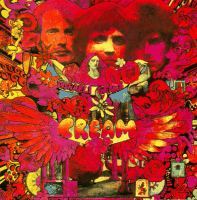
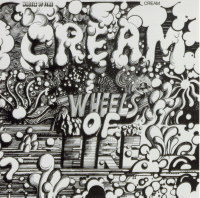
Martin's famed cover
art for Cream's albums Disraeli Gears (1967) and Wheels Of Fire (1968)
Not long after his meeting with Clapton, Martin moved into The Pheasantry at 152 Kings Road, Chelsea, an historic Georgian building on King's Road, Chelsea. As the name suggests, the site was originally used to raise pheasants for the royal household. In the early 1900s it was the home of Eleanor Thornton, the favourite model of artist and sculptor Charles Sykes. Thornton is believed to have been the model for Sykes' most famous work, his Rolls Royce mascot The Spirit of Ecstasy. In the 1920s and '30s it housed the studio of renowned dance teacher Serafina Astafieva, who trained several of Diaghilev's Ballets Russes dancers and who taught prima ballerinas Alicia Markova and Margot Fonteyn. By the time Martin moved in there, Pheasantry was a well-known 'artists' colony', its rooms rented out as apartments and residential studio space. The basement also housed a nightclub which operated into the 1970s. The Pheasantry nightclub was the venue for early gigs by Lou Reed, Queen and Hawkwind, among others, and was the place where singer Yvonne Elliman was discovered by Andrew Lloyd Webber and Tim Rice. The Pheasantry currently houses apartments, shops and a pizza restaurant, which has retained Madame Astafieva's mirrors and practice barre as a feature on the first floor.
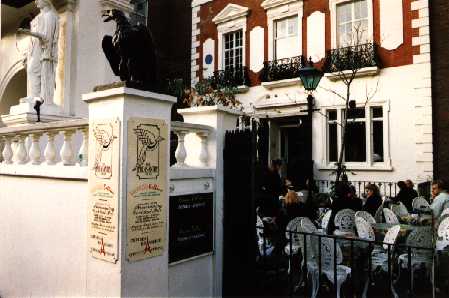
The exterior of The Pheasantry as it looks today.
Martin shared this remarkable domicile Pheasantry with some remarkable people, including Eric Clapton (who moved in not long after Martin), Germaine Greer, filmmaker Phillippe Mora, artist Tim Whidbourne, prominent London "identity" David Litvinoff (later an adviser on the production of Nic Roeg's Performance), writer Anthony Haden-Guest (author of The Last Party: Studio 54, Disco,and the Culture of the Night) and Martin's friend Robert Whitaker, photographer of choice for many leading rock groups on the scene, including The Beatles. Whitaker was already famous for the controversial "butcher" photo used on the original cover of the Beatles' album Yesterday & Today.
Many years later, Martin recalled the story of his meeting with Clapton:
"I visited the Speakeasy Club in London one evening (1967). I saw a girl I knew, Charlotte, who was sitting at a table with two young men who didn't know. Being alone I asked if I could join them and I was made welcome. I remember that there was a discussion about a controversial article which had appeared in The Idealist concerning the assassination of President Kennedy. I gathered that the young men were musicians and as I had just written a poem which I thought would make a good song, I mentioned this fact, and one of the musicians replied that he had just written some music. In grand show business tradition I wrote the lyrics on a paper serviette and gave them to him with my address. I was sharing a studio off the Kings Road Chelsea with the photographer, Bob Whitaker, at the time. I was pleasantly surprised when the musician, who turned out to be Eric Clapton, arrived at the studio with a 45 r.p.m. record with "Strange Brew" on the A-side and my song, "Tales of Brave Ulysses" on the B-side.
Soon after I moved to a nearby studio in "The Pheasantry", Kings Road, Chelsea, and needing someone to share with I asked my new friend if he would care to share the space and experience. Chelsea was an exciting place to live and Eric agreed. (David Litvinoff, a well-known and extraordinary character in the music and art world had found the studio.) It was a perfect place to work and live. Charlotte eventually moved in with Eric. Later we were joined by my girlfriend, Eija, and a young friend from Melbourne, painter and filmmaker, Philippe Mora, and his girlfriend, Freya. David Litvinoff worked in Tim Whidbornes' studio downstairs... Anthony Haden-Guest had a flat there...Germaine Greer was writing "The Female Eunuch" in a room there...there were photographic studios...it was quite a special and creative building...it was called "The Pheasantry" because in the old days the land had been used for breeding pheasants for the King's table.
Eric asked me to design the cover for "Disraeli Gears". I loved record cover art and was very happy to do it. I commissioned my ex-studio mate, Bob Whitaker, to take some photos which were used in a collage on the back cover. I believe the photo used on the cover was a publicity shot that I got from Eric. I was using fluorescent paints at the time. It was the height of psychedelia.
Some of the ingredients in the cover are made up from Victorian decorative engravings. It was done in black and white first and then painted with fluorescent colors. I tried to capture the warm joyful liveliness of Cream's songs. I later went on to design the cover for "Wheels Of Fire" for Cream and also for Ginger Baker's "Airforce", a band called Mighty Baby...Jeannie Lewis' "Free Fall Through Featherless Flight" and a few of my own releases of Tiny Tim, "Chameleon", "Keeping My Troubles To Myself", and "The World Non-Stop Singing Record."
In the basement of The Pheasantry was a club of the same name and often one's sleep was disturbed by the R&B bass notes...so I was reacting by listening to a lot of old songs that had been re-released. Al Jolson, Al Bowly...the dance bands of the war years and earlier. Bill "Bojangles" Robinson, and "Hutch" (Leslie Hutchinson). Eric had seen Tiny Tim perform at The Scene in New York City and knowing I loved the old songs he urged me to go and see Tiny in his first London performance at the Royal Albert Hall. I'd never heard Tiny before and I was completely amazed by his extraordinary, joyful persona and his absolute mastery over the whole language of popular song. I felt I would love to work with him, but thought he was destined to the heights of stardom. I never felt the opportunity would arise. Over twenty years later I write this on letterhead from the film, "Street of Dreams" I have been making with Tiny over the last 12 years, thinking of the hundreds of songs and conversations I have recorded with him over the years. Thus was my entry into the world of popular song.
The meeting of musician and artist directly without intermediaries is, and always has and will be, a fruitful one. Such was the goodwill that existed in London during the late '60's that a painter from Australia could meet a great musician from England and informally give him some lyrics which would become a song, a friendship, a career with Tiny Tim, and a record cover …"
Freed from the constraints of nine-to-five work thanks to a timely inheritance from an aunt, Martin found himself at the epicentre of London's counter-cultural life and the Underground scene and quickly became one of its leading lights. When Richard Neville arrived in London in September, and he and Martin joined forces with Felix Dennis and jointly established London Oz, which soon proved itself even more controversial than its Australian parent, and Martin became its Art Director and chief cartoonist.
This period in London and and his work with Oz brought him international renown. As well as his Oz artwork and his famed album covers for Cream, he produced famous posters of musicians -- Bob Dylan, Donovan and his classic 'exploding' Jimi Hendrix poster, based on a photo by Linda McCartney, which was used for the cover of Richard Neville's memoir Hippie Hippie Shake. These and other works like the poster for the "Legalise Pot" rally are keynote graphic works of the period and originals are now highly prized collector's items.
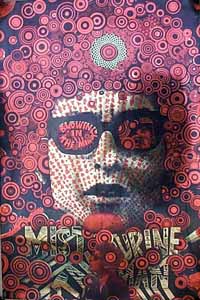
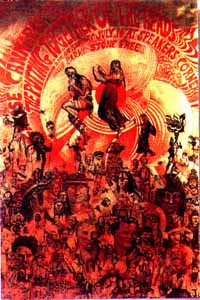
Two of Martin's best-known posters from the
Oz period -- (left) his famous Bob Dylan poster, printed on reflective
foil paper and
(right) the poster advertising the "Legalise Pot" rally and 'Smoke-In'
held at Speakers Corner, Hyde Park, London on 1 May 1967
In 1969 Martin held his second solo exhibition at the Sigi Krauss Gallery. Entitled "Sharp Martin and his Silver Scissors" it featured collages based on famous works of art. He returned to Australia later that year, taking up residency in the old Clune Galleries. Thelma Clune, the Director, had decided to sell the building, but there was no rush for the sale, and under the watchful eye of mutual friend "Charlie'' Brown, Martin presented his first exhibition after his return.
This was followed by ''The Incredible Shrinking Exhibition", which comprised photographs of the first show re-exhibited in small gem-like mirror frames. These two exhibitions laid the foundations for the famous ''Yellow House" project of 1970-71. The house became a unique multimedia space, an art environment in which each room was an entire art work. The Yellow House was open 24 hours a day and had thousands of visitors between 1971 and 1973 when it closed.
Returning to London in 1972, Martin continued his interest with the idea of appropriation. He created "Art Book", another miniature production, approximately 5" x 6" in size and incorporating 36 colour collages cut from the pages of glossy art books, bringing together the work in single images of Magritte and Van Gogh, Matisse and Magritte, Botticelli and Picasso with occasional overlays of Van Gogh on Van Gogh, Van Gogh on Botticelli, or Vermeer on Vermeer.
"I have never been shy about cutting things up if I had a good idea. To me it was worth the price of a book for the idea it expressed, the interconnecting of different worlds. I could put a Gaugin figure in a Van Gogh landscape, make the composition work, and also say something about their relationship."
Distributed in the United Kingdom, France and Italy in 1972, "Artbook" was released in Australian in 1973 to coincide with Martin's return to Australia and his "Art Exhibition" at the Bonython Gallery, Sydney. The previous collage images were presented as completed paintings, returning them to their original medium. Extending viewer involvement, one work, "Self Portrait' was simply a mirror in an ornate gold frame while another more iconicised work was a linen, cheap reproduction of the "Mona Lisa" in an equally ornate gold frame, entitled 'Tea Towel''.
During the mid-Seventies, Martin was probably best known for his work with the Nimrod Theatre, for whom he produced his famous series of Nimrod posters, as well as designing numerous sets, costumes and scenery pieces. His famous Nimrod posters (now prized collectors' items) include his iconic poster for the play "Young Mo". Sharp's rendering of the "Mo" face became the symbol of the Nimrod Theatre and one of Martin's best known images. In this period he also designed the classic cover for Jeannie Lewis' debut album Free Fall Through Featherless Flight (1974).
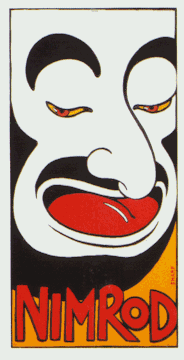
For the rest of the Seventies and beyond, Martin's work and life was dominated by two major obsessions -- Sydney's Luna Park (located close to the Martin's home in Lavender Bay) and Tiny Tim. Martin was engaged as a designer and artist to oversee the restoration of Luna Park, including a commission to renovate the enormous laughing face at the entrance. This long commission had all the ingredients of Pop Art -- nostalgia, huge sculptures, powerful images, wonderful paintings by Arthur Barton along with bright colours and lights. In 1978 he and fellow artist/designer Richard Liney, also an avid collector of memorabilia, loaned their combined collection of hundreds of fairground, circus, Luna Park and sideshow artefacts to the Art Gallery of NSW to coincide with the Festival of Sydney.
In 1979 the tragic fire in the Luna Park Ghost Train claimed seven lives, and silenced the optimism for a newly restored Fun Park. Martin's work on the Luna Park Face was ruined, and the park's theme "Just for Fun" lost its meaning. Like many others, Martin firmly believes the fire was a deliberate act of terrorism aimed at destroying the park and establishing alternative interests. The reason for the arson attack is not hard to discern -- Luna Park's unique location on the northern foreshore of the harbour, adjacent to the north-western tower of the Harbour Bridge, made it a prize of inestimable value to property developers. Along with various other artist friends and sympathetic supporters, Martin was instrumental in forming the Friends of Luna Park in an endeavour to lobby the State Government and remind Sydneysiders of what they stood to lose if the park was lost. Martin's painting "Snow Job" is a poignant reminder of his feelings about this matter, and if it had not been for the efforts of Martin and his friends, Sydney may have lost an important part of its character.
Besides Van Gogh, Tiny Tim has been one of Martin's strongest inspirations.
"Tim's appropriation of song is very much like my appropriation of images. We are both collagists taking the elements of different epochs and mixing them to discover new relationships."
Martin's appreciation of Tiny Tim manifested itself in many ways, including record production, costume design. Martin created a five-metre painting now hanging in Macquarie University was painted during the mid seventies with Tim Lewis. His cherished Tiny Tim film project STREET OF DREAMS is described in the painting "Film Script". Martin laboured for over a decade on this film and it almost led to him selling his house to finance it. However, the story goes that on the eve of the sale, Martin received a surprise cheque in the mail -- it was a substantial royalty payment for his lyrics for Tales Of Brave Ulysses! This enabled him to continue working on the film without selling his house.
Another recurring element in Martin's work is
the now-famous "Eternity" signature. The origin of this image was the
remarkable story of Sydney man Arthur Stace, also know as "Mr Eternity".
Stace was an illiterate former soldier, petty criminal and alcoholic who
became a devout convert to Christianity in the late 1940s. For years after
his conversion up until his death in the 1960s, Stace walked the streets
of Sydney at night writing the single word "Eternity" on walls and
footpaths in his unmistakeable copperplate handwriting. For years Stace's
identity remained unknown until it was finally revealed in a newspaper
article in the early 1960s. Martin's work has perpetuated and
celebrated Stace's work and message and the 'Eternity' image has appeared
in many of his works, including this poster celebrating Sydney's
Haymarket:
Martin's work has been celebrated in many exhibitions including a special
Yellow House retrospective at the Art Gallery of NSW. 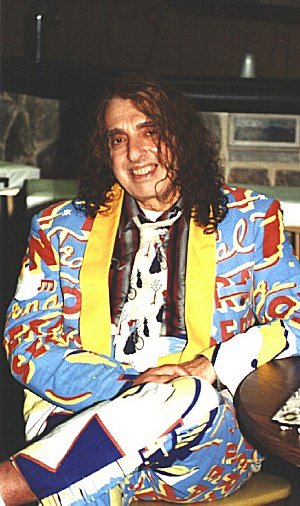
The late, great Tiny
Tim, pictured in the '80s, in one of the suits specially designed for
him by Martin Sharp.
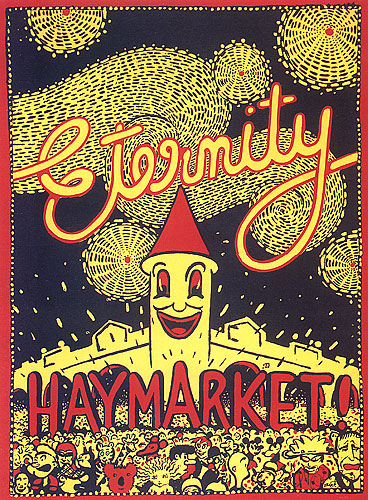
Sharp Art
http://www.greenplanet.com.au/gallery/msharp/workin.htm
Slowhand Archive
http://www.coastweb.de/ftp/slowhand/text_info/disraeli_gears_cover.txt
"Just For Fun"
education pack, Art Gallery of SA
http://www.artgallery.sa.gov.au/Martin%20Sharp%20Ed%20Pack.doc
Mudie, Peter
UBU: Sydney Underground Movies 1966-70 (UNSW Press, 1997)
Tiny Tim Memorial
Site
http://www.tinytim.org/
Queeny Places To
Go
http://www.pemcom.demon.co.uk/queen/london.html
Jerusalem Post,
March 28 2001
http://www.jpost.com/Editions/2001/03/28/Food/Recipes.23756.html
Paul Tritton
Eleanor, In Body Or Spirit? (1986)
http://rroc.org.au/library/eleanor_spirit.html
Please email
Milesago
if you have any extra information to add to this page
Copyright ©Milesago 2002
Please report any broken links to
webmaster@milesago.com